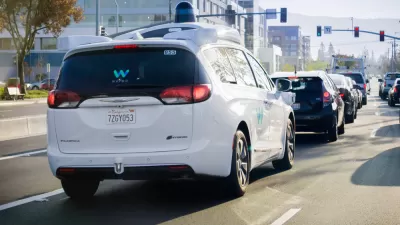Denver developers are building parking that can be converted into housing, anticipating radical changes that autonomous vehicles could bring to city life.
In a forward-thinking move to anticipate some of the radical changes that could be coming from autonomous vehicles, Denver developers are building parking that can be converted into housing or retail. Their thinking, according to a story in the Denver Post by Emilie Rusch, is that as people switch to using autonomous vehicle services to drive them around, the need for personal vehicles will decrease dramatically and cities will be overstocked with parking.
Far from seeing this as the dreams of some far-fetched future, the development group, Denizen, has already started building for this eventuality. "The more than 700 above-ground parking spaces in the project’s first phase have been designed so they can be renovated into residential, office or retail space as future demand warrants," Rusch reports.
Thomas Fisher, Director of the Metropolitan Design Center at the University of Minnesota, hypothesizes that, "one shared autonomous vehicle, operating like today’s taxi or car-sharing services but without a human driver, could take as many as 11 conventional vehicles off the road." This vision of the future is more than academic in Denver; parking must be ready to be upgraded or, in some situations, it will be in violation of city code. "In Denver, the ground floor of stand-alone parking garages downtown are required to be suitable for conversion to an active, nonparking use in the future" according to City Planning and Development Supervisor Chris Gleissner.
FULL STORY: Denver developers have seen the future of parking, and it is no parking at all

Manufactured Crisis: Losing the Nation’s Largest Source of Unsubsidized Affordable Housing
Manufactured housing communities have long been an affordable housing option for millions of people living in the U.S., but that affordability is disappearing rapidly. How did we get here?

Americans May Be Stuck — But Why?
Americans are moving a lot less than they once did, and that is a problem. While Yoni Applebaum, in his highly-publicized article Stuck, gets the reasons badly wrong, it's still important to ask: why are we moving so much less than before?

Research Shows More Roads = More Driving
A national study shows, once again, that increasing road supply induces additional vehicle travel, particularly over the long run.

Which US Rail Agencies Are Buying Zero-Emissions Trains?
U.S. rail agencies are slowly making the shift to zero-emissions trains, which can travel longer distances without refueling and reduce air pollution.

San Diego School District Approves Affordable Housing Plan
The district plans to build workforce housing for 10 percent of its employees in the next decade and explore other ways to contribute to housing development.

Lawsuit Aims to Stop NYC’s ‘City of Yes’ Zoning Reforms
A lawsuit brought by local lawmakers and community groups claims the plan failed to conduct a comprehensive environmental review.
Urban Design for Planners 1: Software Tools
This six-course series explores essential urban design concepts using open source software and equips planners with the tools they need to participate fully in the urban design process.
Planning for Universal Design
Learn the tools for implementing Universal Design in planning regulations.
City of Moreno Valley
Institute for Housing and Urban Development Studies (IHS)
City of Grandview
Harvard GSD Executive Education
NYU Wagner Graduate School of Public Service
City of Cambridge, Maryland
Newport County Development Council: Connect Greater Newport





























